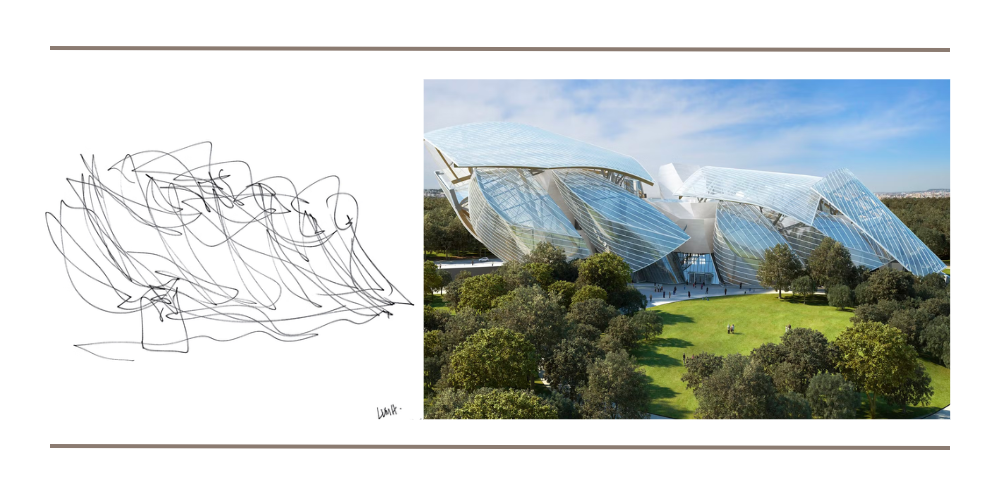SKETCH MONTH
January 11, 2023
 I studied architecture in college. Mostly, this means I got to use colored markers and draw a lot of pictures. But architecture school taught me the incredible importance of process – how an invisible idea in the imagination can eventually become a reality that someone can live in.
I studied architecture in college. Mostly, this means I got to use colored markers and draw a lot of pictures. But architecture school taught me the incredible importance of process – how an invisible idea in the imagination can eventually become a reality that someone can live in.
One of my favorite architects, Frank Gehry, is a great example of this. His design process begins with a crude sketch. It’s hard to believe that what looks like scribble scrabble is actually the first step in a process that leads to a masterpiece of a building.
The above picture is the Louis Vuitton Foundation in France. Next to the picture is the sketch that would begin the process that would become the finished building.
Gehry understands the value of a sketch, no matter how rough, imperfect, or incomplete it may appear. He knows that without the sketch, there would be no masterpiece.
A sketch requires a kind of courage. The courage to simply put down what you see—knowing that it won’t be perfect. The beauty of a sketch is that it allows you to observe what you see and then add to it, allowing it to take shape. You can push on it and consider it and then make changes as you come to see what you didn’t see before.
My One Word is a lens and therefore, it is about vision. Picking One Word is a way to develop personal vision for our lives—a picture of the kind of person we hope to become. And as much pressure as we may feel to have perfect vision for our lives, the masterpiece that God is forming will likely begin with a sketch. So let’s consider what we see and spend some time with our observations to see what we might not have seen before.
This month, I encourage you not to rush the process of picking your one word. Instead, as you begin to prayerfully consider and plan, give your self permission to simply sketch.
What kind of character you’d like to see develop?
What kind of person would you’d like to be this time next year.
What do you long for God to do in you?
Allow these thoughts to be imperfect and incomplete.
By doing so, you get to see what you see… and also begin to identify what you don’t yet see.
I realize this is uncomfortable for many of us. We want to skip over the imperfect and incomplete to our ideal of a finished product.
But if we don’t permit things to be imperfect and incomplete, we will default to what we already see and to what we already think. We will settle for what’s comfortable and manageable and end up stuck in the same old cycle, living out what we’ve always known.
So, for the month of January, let’s embrace the process, no matter how messy, imperfect, or incomplete it may feel. I invite you pick up your pen and sketch.





